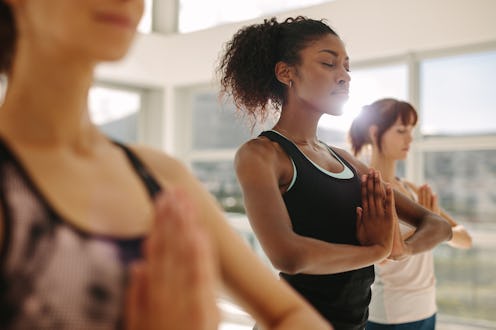There are so many reasons to incorporate a regular fitness practice into your routine, from building stronger bones and muscles to helping you get a better night's sleep — not to mention what it can do for your brain. You may have noticed that certain types of exercises can leave you feeling more calm, clear, and confident than before you started. However, some find even the thought of rigorous physical activity completely undesirable (or even, perhaps, unhealthy?) in moments of stress. Such varying opinions begs the question: Does working out help with anxiety or could it end up making things worse?
According to experts, the answer isn't so simple. First of all, the level of your anxiety could be a determining factor. "I always recommend that my clients experiencing extreme anxiety, especially when having panic attacks, limit the amount of exercise that elevates their heart rate a significant amount," says Rachel Thomasian, a licensed therapist at Playa Vista Counseling. "I prefer more grounding and mindful exercises like yoga or walking for trying to reduce anxiety."
Ava Johanna, yoga, breath, and meditation teacher, and the creator of The Alchemized Life podcast agrees that a yoga practice could be your best bet if too much of a heart rate increase could send you into a panic. One way it helps is by addressing physical signs of stress in the body. "Yin yoga goes beneath muscle activation by targeting the fascia and opening the body from past stressors," she explains. "[The] emphasis is on relaxing into deeper stretches and utilizing the breath to create an opening and release within the physical body."
The meditative aspect of yoga is another reason those struggling with anxiety might find the practice a helpful solution, but if even that type of movement doesn't feel good to you, you can simply borrow the other benefits by trying some breath work. "There is a yogic pranayamic technique which can also help to think calmly and clearly," suggests Annie Gurton, a Sydney-based Imago Relationship Therapist. "On every out-breath, try to expel as much air from your lungs as possible. Breath in normally, don’t try and ‘hold’ your breath, and breath out for as long as possible. Aim to empty the breath from every corner of your lungs. You’ll find that you engage your pre-frontal cortex and are able to think better. Both anxiety and depression can be eased with this simple technique."
If you're up for something trying a little more rigorous, there is some science that proves activities like high intensity interval training might also help. For example, that blissful feeling you may have experienced after a workout? It's no coincidence. "This seemingly counterintuitive euphoria has to do in part with what are sometimes referred to as 'the happy chemicals'," shares Micah Golden-Grant, Head of Performance Training at Body Dynamix Sports Medicine in Los Angeles. "These include endorphins, serotonin, adrenaline, and dopamine. There are a handful of exercise types said to increase the body’s production of these mood-boosting happy chemicals, one of which is High Intensity Interval Training."
And Gurton agrees. "When we are exercising there are lots of things happening throughout the body including altering the oxygen/carbon dioxide ratios in the blood which positively nourishes our brains," she explains. "As a result we think more clearly and our mood will lift."
Karena Dawn, co-founder of Tone It Up, is also a fan of HIIT to help with anxiety. "I work out just as much for my mental health, too," she explains. "When I'm feeling anxious or stressed, exercise makes me feel strong, centered, and supported." Particularly, she recommends series of squat jacks, high knees, walk out/plank jacks, side plank with crunches, and bicycles for 45 seconds each, repeated three times, and adds that the Tone It Up app is also an easy way to access quick, stress-reducing workouts — even if you've only got about 10 minutes.
If regular workouts are already a part of your routine, Gurton advises that stopping cold turkey because of anxiety might do more harm than good. "What I wouldn't recommend is for someone to stop exercising altogether," she says. "Because then they're removing their source of self-care as well as stopping their feel-good source of serotonin." Additionally, changing up your workout from time to time can be a benefit — but that doesn't mean having to give up the one you love most. "Select a primary activity to concentrate on daily, but have a couple of others to do once or twice a week to mix things up a bit," she explains. "You don’t want to become bored with your exercise routines.”
